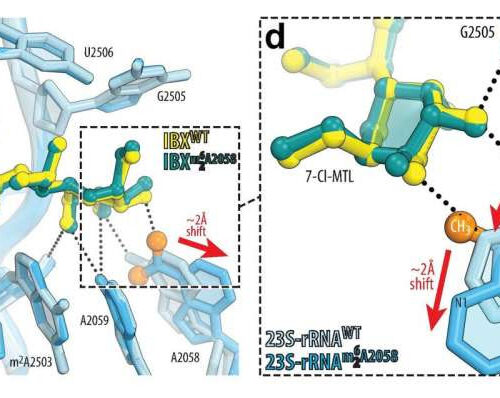by University of Illinois at Chicago Structural visualizations reveal that iboxamycin displaces the methylated nucleotide and binds in deep pocket of the ribosome. Credit: Polikanov, et al. A new study published in Nature reports on a new antibiotic that binds to the ribosome of bacterial cells and stops drug-resistant pathogens from making mice sick. Co-authored by researchers...
Tag: <span>ribosome</span>
How antibiotics interact with each other
by University of Cologne It is usually difficult to predict how well drugs will work when they are combined. Sometimes, two antibiotics increase their effect and inhibit the growth of bacteria more efficiently than expected. In other cases, the combined effect is weaker. Since there are many different ways of combining drugs—such as antibiotics—it is...
The self-synthesizing ribosome
As the cell’s protein factory, the ribosome is the only natural machine that manufactures its own parts. That is why understanding how the machine, itself, is made, could unlock the door to everything from understanding how life develops to designing new methods of drug production. An intensive, long research effort at the Weizmann Institute of...
Defects in the ‘Swiss-army knife’ of gene expression may contribute to neuronal diseases like Alzheimer’s
The growth, death, and diseases of complex organisms rely on the flow of information — from genes in DNA, through their transcription into RNA, and then translation of that transcript into proteins, which in turn build much of the living organism. Proteins that control this whole process are themselves subject to this overarching information flow...
Inhibition of ribosome biogenesis as a novel approach for multi-stage cancer treatment
by Uppsala University Nearly 90 percent of all cancer patient deaths are due to metastasis. A study from Uppsala University shows that a process that allows the cells to metastasise is aided by the synthesis of new ribosomes, the cell components in which proteins are produced. The results open the possibility for new treatment strategies for advanced cancers. The study...



